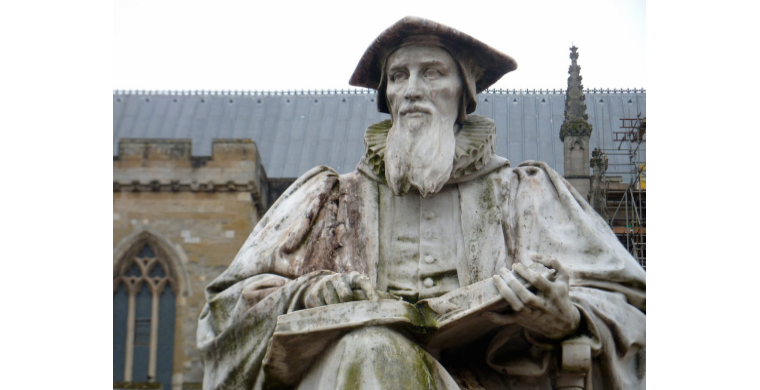RICHARD HOOKER
By Chuck Collins
www.virtueonline.org
November 4, 2023
RICHARD HOOKER, the gentlemanly theologian of Reformation Anglicanism, died November 2, 1600 at the age of forty-six.
He stands apart from the other English reformers by his refusal to use the belittling polemical tactics of his day. "It is not how passionately someone is convinced," he wrote, "but how soundly they argue, that should convince us that their views genuinely come from the Holy Spirit, and not from the deceit of that evil spirit."
Hooker was perfectly happy serving out his ministry as a country priest and was never a bishop or in a high position. Bradford Littlejohn and Nigel Atkinson both point out the different ways some have used Hooker to promote their own theological agendas: some claiming he was anti-Calvinist (in his strong opposition to the radical Puritan nonconformists of his day), claiming that he is Thomas Aquinas warmed over, and framing him as a "high churchman."
Hooker was, in fact, neither of these. He fully embraced the Reformation Anglicanism of Thomas Cranmer and the other reformers on all the central doctrinal tenets of the Anglican formularies.
Alister McGrath points out that Hooker's primary argument with the Roman church is their core teaching that righteousness is inherent and infused incrementally over time, that eventually renders Christians worthy of salvation.
For Catholics, it is essentially justification by sanctification. The English reformers taught that we are never righteous enough, not even one! Therefore, we must look for a righteousness outside of ourselves. We will say, "we do not presume to come to this thy Table, O merciful Lord, trusting in our own righteousness, but in thy manifold and great mercies." It is God's righteousness imputed offered as a free gift to unworthy sinners that makes Christians able to come before a wholly righteous God and be saved.
Philip Edgcumbe Hughes reminds us of Hooker's complete agreement with the Reformation doctrine of justification by grace through faith alone: Hooker wrote that "to make a wicked and sinful man most holy through his believing is more than to create a world of nothing." The modern idea of the three-legged stool of authority - Scripture, reason and tradition (as separate and equal sources) - is commonly and falsely attributed to Richard Hooker.
In fact, in his "Of the Lawes of Ecclesiastical Polity," he valued reason and tradition highly, but always and everywhere spoke of the Bible as primary, and as the authority to which all other authorities accede.
Hooker also shared the sacramental theology of historic Anglicanism - that Christ is dynamically present in the liturgical action rather than statically located in the bread and wine in a moment of consecration: "the real presence of Christ's most blessed body and blood is not therefore to be sought for in the sacrament, but in the worthy receiver of the sacrament...only in the very heart and soul of him which receiveth."
Justitia Dei, Alister McGrath Richard Hooker And the Authority of Scripture, Tradition and Reason, Nigel Atkinson Richard Hooker: A Companion to His Life and Work, W. Bradford Littlejohn Faith and Works: Cranmer and Hooker on Justification, Philip Edgcumbe Hughes.
END














